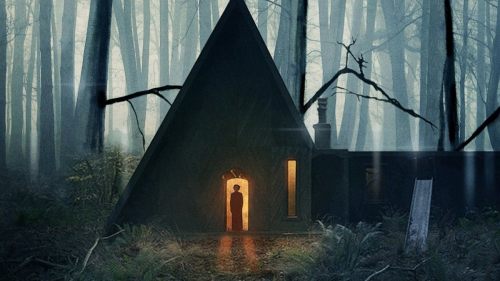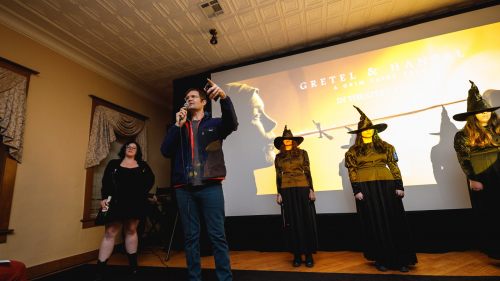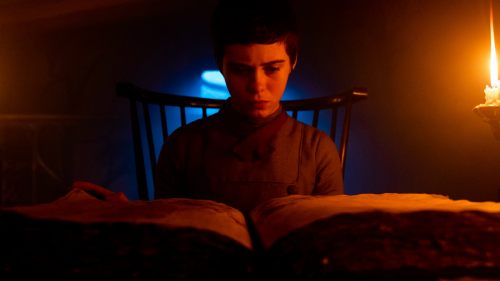Oz Perkins Talks THE BLACKCOAT’S DAUGHTER And Mining Horror Cinema From Personal Tragedy
Osgood ‘Oz’ Perkins has led a rather privileged yet tragic life. The son of Anthony Perkins and Berry Berenson, he literally had to fill his father’s most famous character’s shoes, as his first film role was playing twelve-year-old Norman Bates in Psycho II. Anthony was sadly diagnosed with AIDS during the filming of Psycho IV, and then died only a few years later from pneumonia at the age of sixty. Oz’s mother, a photographer from New York, was one of the multitude of casualties America suffered during the September 11 attacks.
By 2001, Perkins had amassed a handful of acting credits, including Legally Blonde and Not Another Teen Movie. Today, he confronts and mines his personal losses in the form of horror films, including the ghostly I Am the Pretty Thing That Lives in the House. Before that, he helmed The Blackcoat’s Daughter, an oppressively moody movie about malevolent forces run amuck at a girls’ boarding school (which was previously known as February, when this writer first saw it back at Fantastic Fest 2015). Now A24 is delivering this chilling dissection of grief directly into your home, exclusively on DirecTV starting February 16th.
We had the opportunity to sit down with Oz, and what followed was a rather candid discussion regarding how one copes with their own losses through genre cinema…
BMD: When we first saw The Blackcoat’s Daughter all the way back at Fantastic Fest ’15, it was called February. Why the title change and how did you come up with that?
Oz Perkins: The title change was suggested by the lovely A24, who bought the movie out of TIFF. It was just one of those things where they want to position the movie, genre-wise, as best they can. And I get it – I said to someone else earlier today: “I used to think there were three stages to making a movie, but really there’s four.” First, you write. Then you shoot and cut it. Then you show it. Showing the movie is a totally different animal than actually creating the movie, because they’re really not related anymore. You just say, “ok, this needs to be seen, and in order to be seen, I agree to sort of do whatever needs to be done in order to make that happen.” I would’ve preferred to have kept the original title, as I lived with February much longer than I did The Blackcoat’s Daughter.
The Blackcoat’s Daughter comes from a snippet of one of the songs that my brother [Elvis Perkins] wrote for the movie. He found an old rhyme, this great old American folk rhyme that, of course, doesn’t even have a credited author. One of those folky type of things. And it was an antiquated turn of phrase that had a flash of originality to it that I liked, and worked thematically well enough.
BMD: What’s fascinating about the two features you’ve directed is that they’re centered around these women who experience a tragedy or trauma. Talk to me about making horror movies that derive their terror from tragedy.
OP: Before these first two films, there was nothing. No commercials, no music videos, no student films. I wouldn’t know how to make things that weren’t about me, my experience, and the things that life has taught me. The tragic loss of my mother and the equally tragic loss of my father were both, in their own way, defining for me, as they would be for anybody. In the case of The Blackcoat’s Daughter, it’s a movie about losing your parents. The fact that it’s also a Satanic movie, and it’s a movie about girls stabbing girls, is trim or, as I call it, The Trojan Horse for the reality I’m trying to present. And that reality is a movie about what happens when you do suffer such a cataclysmic loss. Kat (Mad Men’s Kiernan Shipka) is me in this movie – a person who has lost both of her parents. Then it’s about what happens after that loss. What the fuck do you do? What moves into that space those two people leave behind? It’s as much about [grief] as it is a horror movie.
BMD: Now you say these movies are about you, but you’re placing yourself into two women. Is this something that grows organically out of the stories you want to tell, or is putting a woman protagonist front and center a deliberate decision going into the script’s creation?
OP: Women are just more interesting. For me, the horror genre is mostly about the things that are hidden from us. A good horror film is about things that even their makers don’t fully grasp themselves. It’s kind of like what Bob Dylan once said, “you know there’s something here, but you don’t quite know what it is.”
So for me to place these stories inside of the feminine experience gives me, the male author, a way to explore an existence that I do not myself endure everyday. It’s hidden from me. There’s more to it than anything I could ever know. There’s not a complete language for me. If I stay with women protagonists, it reminds me that there are things that I will never fully understand. It becomes a useful and more engaging approach for me creatively.
BMD: Like exploring parts of yourself that you may not even recognize as well?
OP: Yeah, exactly. It just makes my job more interesting and women characters, for my money, are way more compelling. It’s more fascinating to watch Monica Vitti in L’Avventura than it is to watch Ryan Gosling in anything.
BMD: You touched on your parents’ death earlier, and with Pretty Thing, you dedicate the movie to your father, who in the dedication you say left you an “old house”? Are you making all of these movies within that same “old house”?
OP: That’s a terrific question – because my father both left me a literal old house in Massachusetts, but I’m also operating within this realm of experience that was gifted to me by both of my parents. That movie is more deliberately about me looking for my father, who was rather unknowable to me in life. Pretty Thing is, in some way, me atoning for never having a certain kind of relationship with him. And in order to give it a very specific brand of authorship, I made it about my search for that relationship posthumously.
BMD: It’s you again broaching the unknowable in a way.
OP: Exactly. The horror of things we didn’t have in life that haunt us in death.
The Blackcoat’s Daughter is exclusively available on DirecTV, beginning February 16, and out in limited theatrical release March 31.



